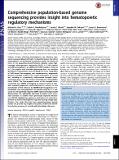Comprehensive population-based genome sequencing provides insight into hematopoietic regulatory mechanisms
Author(s)
Guo, Michael H.; Nandakumar, Satish K.; Ulirsch, Jacob C.; Buenrostro, Jason D.; Natarajan, Pradeep; Salem, Rany M.; Chiarle, Roberto; Mitt, Mario; Kals, Mart; Pärn, Kalle; Fischer, Krista; Milani, Lili; Mägi, Reedik; Palta, Priit; Metspalu, Andres; Esko, Tõnu; Zekavat, Seyedeh M.; Gabriel, Stacey; Lander, Eric Steven; Kathiresan, Sekar; Sankaran, Vijay G.; Hirschhorn, Joel N.; ... Show more Show less
DownloadGuo-2016-Comprehensive population-based genome.pdf (1.921Mb)
PUBLISHER_POLICY
Publisher Policy
Article is made available in accordance with the publisher's policy and may be subject to US copyright law. Please refer to the publisher's site for terms of use.
Terms of use
Metadata
Show full item recordAbstract
Genetic variants affecting hematopoiesis can influence commonly measured blood cell traits. To identify factors that affect hematopoiesis, we performed association studies for blood cell traits in the population-based Estonian Biobank using high-coverage whole-genome sequencing (WGS) in 2,284 samples and SNP genotyping in an additional 14,904 samples. Using up to 7,134 samples with available phenotype data, our analyses identified 17 associations across 14 blood cell traits. Integration of WGS-based fine-mapping and complementary epigenomic datasets provided evidence for causal mechanisms at several loci, including at a previously undiscovered basophil count-associated locus near the master hematopoietic transcription factor CEBPA. The fine-mapped variant at this basophil count association near CEBPA overlapped an enhancer active in common myeloid progenitors and influenced its activity. In situ perturbation of this enhancer by CRISPR/Cas9 mutagenesis in hematopoietic stem and progenitor cells demonstrated that it is necessary for and specifically regulates CEBPA expression during basophil differentiation. We additionally identified basophil count-associated variation at another more pleiotropic myeloid enhancer near GATA2, highlighting regulatory mechanisms for ordered expression of master hematopoietic regulators during lineage specification. Our study illustrates how population-based genetic studies can provide key insights into poorly understood cell differentiation processes of considerable physiologic relevance.
Date issued
2016-12Department
Massachusetts Institute of Technology. Institute for Medical Engineering & Science; Broad Institute of MIT and Harvard; Massachusetts Institute of Technology. Department of Biological Engineering; Massachusetts Institute of Technology. Department of BiologyJournal
Proceedings of the National Academy of Sciences
Publisher
National Academy of Sciences (U.S.)
Citation
Guo, Michael H.; Nandakumar, Satish K.; Ulirsch, Jacob C.; Zekavat, Seyedeh M.; Buenrostro, Jason D.; Natarajan, Pradeep; Salem, Rany M. et al. “Comprehensive Population-Based Genome Sequencing Provides Insight into Hematopoietic Regulatory Mechanisms.” Proceedings of the National Academy of Sciences 114, no. 3 (December 2016): E327–E336. © 2016 National Academy of Sciences
Version: Final published version
ISSN
0027-8424
1091-6490